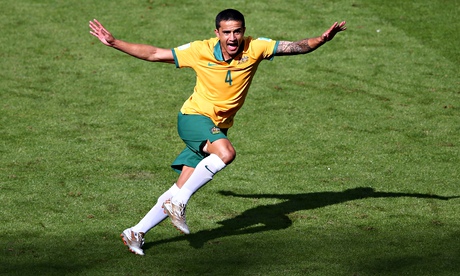
Australia's Tim Cahill celebrates scoring an outstanding goal against Holland in the first half at Estadio Beira-Rio. Photograph: Paul Gilham/Getty Images
The grand neoclassical facades of downtown Porto Alegre face the choppy, muddy waters of the Guaíba River through a veil of highways and crumbling wharves. They acknowledge the river but are disconnected from it. When the Australians lined up to face the Dutch, their faces were something like those buildings: proud but somehow withdrawn. Were they scared? Would they sit back, overawed and over-respectful, in the first quarter-hour as they did against Chile?
They answered those questions in resounding style as the triple gift of a wonderful goal from the country's greatest ever player, a canny substitution from the coach, Ange Postecoglou, and some straight fighting spirit put the Socceroos, briefly and tantalisingly, into the lead against one of the most talented teams in this World Cup.
In the end it wasn't enough, and the Socceroos ran out of steam as the Dutch scraped to a nervous, frenzied victory. But for much of the game Australia matched their fancied opponents with a composure and skill belying their status as the lowest-ranked team in the tournament. With better finishing, most notably the two chances created for Mark Bresciano and Matthew Spiranovic late in the first half, things might well have been different.
The disappointment in the Australian camp will be deep; how they will rue those missed opportunities. But there will surely be a quiet pride at how far this team has come, so quickly, since the plodding gloom of their halting, defence-minded World Cup qualification campaign. What an exceptional game this was.
After the clamping heat of Cuiabá, to play football under clear skies in this agreeable, temperate city was akin to breathing in a shot of pure oxygen. For much of a thrilling first half, the football faithfully reflected the vibrant nature of Porto Alegre. Australia matched the Dutch more than comfortably and exploited the space in the middle created by their opponents' defensive bank of five to push out in attack. Matthew Leckie continued his surging form from the opening match, while Australia's central defensive pairing of Spiranovic and Alex Wilkinson kept Robin van Persie quiet.
From there, it was a straight character piece, each team's leading light providing the match with its two banner moments. Arjen Robben, Tim Cahill: a study in contrasts. Like a good taxi driver, Robben is skilled in tight spaces and long green-light stretches of open road alike. Time and time again throughout this match, he slippered a way out of the attentions of Australia's midfielders and floored it - Robbened it, really - towards goal. Robben's runs have an aerodynamic irresistibility to them that only an abundance of talent and a perfectly bald pate can procure. The run he produced for the first Dutch goal was a prime example of the genre: Wilkinson was shrugged aside contemptuously before a simple 50-metre sprint down the left channel was capped with a finish past Mathew Ryan that was as smoothly reassuring and clean as seat velour in a new car.
Cahill's response, when it came, was as glorious as it was unexpected. For much of his career Cahill has been cast as a player who flourishes in the close spaces of hand-to-hand combat; he's a foot soldier (a head soldier, if you prefer) more than a cavalryman. But his goal here was of a skill and beauty of execution to dispel even the stickiest of preconceptions about a player who must surely now rank as Australia's best ever.
Measuring up a long, raking pass from Ryan McGowan, picked at right-back to replace the injured Ivan Franjic, Cahill thumped in a precise, first-time strike that immediately assumed a place in the first rank of history's great volleys. Forget the question of whether it is Australia's greatest ever goal (it almost certainly is); the real poser is whether there will be a better strike this World Cup. A yellow card means Cahill will miss the final group match against Spain. What a shame that the World Cup will never again provide a canvas for the expression of his rattling, combative genius.
Mile Jedinak's penalty, expertly won by Oliver Bozanic, brought on in place of Bresciano in a tactical masterstroke by Postecoglou, gave Australia reason to believe. But then came Van Persie; then came Memphis Depay. For the Socceroos, the dream suddenly, cruelly vanished.
But even though Australia are now out of the running, they can at least console themselves with the thought that they have managed to crown this exhilarating World Cup with many of its best, most rollickingly entertaining early moments. Australia's defeats have been the most beautiful of defeats.
Post By http://www.theguardian.com/football/blog/2014/jun/18/australia-holland-tim-cahill
0 comments Blogger 0 Facebook
Post a Comment